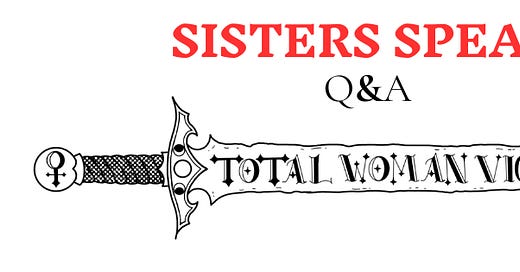Q&A: Sisters Speak
Every issue, Total Woman Victory’s Editorial Team will answer questions sent in by our readers!
Q: How can I introduce my libfem sister to radfem topics without scaring her off?
A: Maya:
So I really think it depends! I actually have experience on your sister’s side in this scenario so I can talk about my experiences and state of mind! I know when my friend started getting into radical feminism and talked to me about her changing views, I was so incredibly uncomfortable because I was very much a libfem back then, and this all seemed so blasphemous, especially the gender abolition aspect of it. What let me get over this initial discomfort was the fact that I knew my friend was a kind, smart, and reasonable individual, which made me want to give her a chance and hear her out. Over the course of about a year I started agreeing with her stances and I ended up peaking. So it was definitely a slow process for my friend and I’m thankful she stuck through with it. Regarding your case, think about your relationship with your sister! Does she understand you as a person, and is she typically willing to hear you out? I would also start with less controversial topics like, in my opinion, the radical feminist stances on plastic surgery and makeup since those can be attributed to other branches of feminism as well.
Q: Any tips for finding like-minded radical feminists in real life?
A: Winnie:
I live in the USA where liberal feminism runs rampant, so I only started looking further into radical feminism after hearing about it on Twitter. As opposed to finding other radical feminists, in my case, I simply began discussing what I was seeing on social media with my friends. My friend group often has long talks about politics and feminism, so I would share quotes from Dworkin books I was reading, or Tweets that generated tons of discussion to see what they thought about it. We all ended up educating ourselves together, and now I have a group of friends in real life that I feel comfortable talking to about radical feminism. Sometimes it can be as simple as speaking to the people you’re around every day!
Q: Are terms like 'gold star lesbian' and general lesbian purism problematic?
A: Winnie:
For readers that are unaware, a “gold star lesbian” is a lesbian that has never had a sexual relationship with a man. This term is something that has been long-discussed and debated within the lesbian community. Now obviously, being a gold star lesbian isn’t problematic, but the way that some lesbians have weaponized this term can be. It’s no surprise that some lesbians find pride in the fact that they avoided sexual relationships with men their whole life—in a heteropatriarchy, this is no small feat. However, thinking further about this term brings up uncomfortable questions. If a lesbian has a nonconsensual sexual experience with a man, does she stop being a gold star lesbian? And further, should lesbians really be categorized by whether or not they had a romp with a boy in their younger years, or even lesbians that took longer to come to terms with their homosexuality, like those that have been married to men?
I think that it’s normal to want a term or a community of women that have never had sex with a man—it’s something that can make you feel isolated and alone when you realize that even fellow lesbians have had sexual experiences with men while you haven’t. However, for the lesbian community as a whole, I think it would be healthier to focus on other aspects of being a homosexual woman, like rejecting heterosexual dating practices and patriarchal beauty standards. How much does being a “gold star” matter if you’re still male-centered in other aspects of your life?
Q: What's the ideal outcome of the Israel/Palestine conflict? Wouldn't Palestine being absorbed wholly by Israel be better politically and culturally for the Palestinian women? LGB, no pressure to wear Hijab, free to leave Islam, free from Islamic misogynistic culture and rules, etc.
A: Judith:
This question is premised on an understanding of events disconnected from historical reality. We need only look at examples of how populations have reacted in the past to different circumstances: What dynamics led to the improvement of women's conditions over time? What dynamics led to their deterioration? Keep in mind the universal truth that women are disproportionately negatively affected by war and poverty. The same tactics Israel is using to occupy Palestine have been used by the US in its occupation and regime change operations in many countries. In both instances, the end result is displacement, impoverishment, mass death, and increased religiosity.
Why are all the prominent resistance groups in Palestine today religious? The secular resistance groups were wiped out by Israel. Why is your average Palestinian more religious (and women more likely to veil) today? Financial hardship and psychological distress causes increased religiosity in populations. The ideal outcome of the Israel/Palestine conflict is an economically and politically sovereign Palestinian state where the Palestinian diaspora is free to return and rebuild infrastructure without fear of systemic violence. Only then will the excessive suffering of Palestinian women cease.




